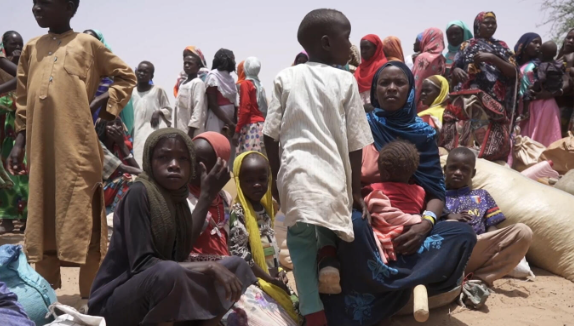An estimated 7,000 Sudanese from Al-Junaynah, also known as Geneina Fort, in West Darfur fled to the Adré Refugee Camp in neighboring Chad and currently face dire conditions including a lack of food and other necessities.
Radio Tamazuj caught up with and sounded out a civil society activist, Ibrahim Musa Shomou, who sought refuge in Chad. He says the refugees lack shelter, food, and access to clean water and that most of the children in the refugee camp are malnourished.
He said the refugees have had conflicts with the host community over water points and firewood because felling trees is illegal in Chad.
Below are edited excerpts:
Q: Tell us about the humanitarian situation in the Adré Refugee Camp in Chad.
A: Since the arrival of the Sudanese refugees in Chad, we have observed that the response from humanitarian agencies has been slow. The presence of UNHCR, WHO, and MSF is vital but we face significant challenges in the delivery of food and water to the refugees.
Additionally, there are issues surrounding the refugees’ access to necessities like water. Many refugees have also been sent to new settlement camps, but the shelters provided by humanitarian organizations are insufficient given the population.
Q: How many refugee camps are there in Adré?
A: In Adré, there is only one camp for Sudanese refugees. The refugees are scattered in the area because Adré serves as an arrival site. We do not have the precise figures of Sudanese refugees in Chad yet but efforts are underway to count those who have crossed and determine the fate of those who may have been lost or deceased while fleeing the conflict.
Q: Are refugees in Adré still at the transit site or have they been relocated to new settlement camps and where in Sudan are these refugees from?
A: Most of the refugees are from West Darfur with a few from South and Central Darfur. The process of transferring them to new camps began on 10 July, however, those relocated have not received food aid, and some lack proper shelters.
Additionally, since their arrival, they have received only one ration of food assistance. Malnutrition-related diseases are skyrocketing among children and the elderly due to food shortages. Some have even resorted to collecting tree leaves for cooking.
Access to water in the camp is also a significant problem with 70 percent of refugees drawing water from streams.
Q: Approximately how many refugees are there in Adré”
A: It is estimated to be more than 700,000 and this accounts for approximately 80 percent of the population of Al-Junaynah which has nearly 1.2 million inhabitants. This number is significant but precise figures have yet to be provided.
Q: Have there been any deaths among the refugees?
A: Yes, there have been cases of children dying from malnutrition, deaths due to chronic diseases, and two deaths resulting from skirmishes between factions around the camp.
Q: How many children have died from malnutrition?
A: I do not have the exact number but some children and people with chronic conditions arrived malnourished, a condition that persisted from the siege of Al-Junaynah.
Q: Reports suggest that there is insecurity in the camp due to the large refugee population and tensions with host communities. Could you elaborate?
A: There have been minor clashes, particularly over resources such as water. In Chad, tree cutting is illegal and when the refugees arrived, they began cutting trees for cooking, leading to conflicts with local women who collect firewood. Chadian authorities intervened, and the issue was resolved. Currently, refugees collect dry firewood instead of cutting trees.
However, water remains a pressing issue. Committees comprising refugees and host community members are addressing these and other minor issues.
Q: As activists and civil society representatives, have you been able to communicate the refugees’ needs to humanitarian organizations in the area?
A: Yes, we have engaged with all humanitarian organizations in the area. They acknowledge the challenges posed by the massive influx of refugees to Chad. They are working to address their needs despite facing difficulties like funding shortages and ongoing conflict in Sudan.
They expect to resolve basic needs by the end of October. However, we still require intervention from the Red Cross and MSF to assess the number of missing individuals, estimated to be around 1,000, mostly men aged 18 to 40.
Q: What is the current security situation in the camp?
A: The camps are under Chadian government protection with police stations established within them to safeguard the refugees. While sporadic shootings occurred, Chadian police have since increased patrols to ensure safety, especially along the route from Adré to the camps. However, these incidents have left refugees apprehensive about moving freely.
Q: Any final message you’d like to share?
A: I urge all the humanitarian organizations to provide aid assistance to refugees in the area. Additionally, we must seek justice against those responsible for the crimes committed against civilians during the siege of Al-Junaynah.




